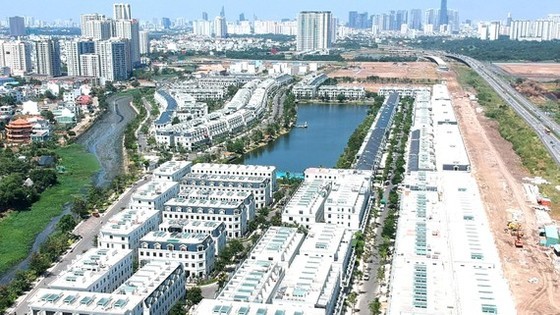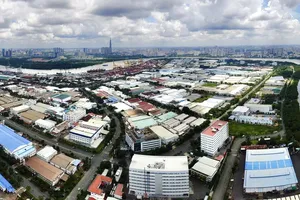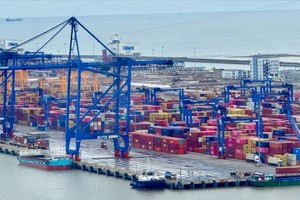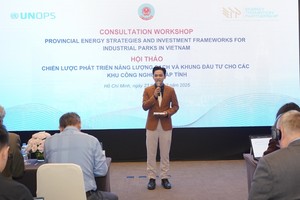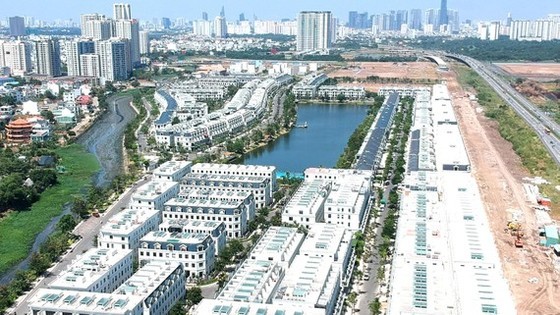
 Participants at at the Financial Forum 2022
Participants at at the Financial Forum 2022
He made the statement at the Financial Forum 2022 with the theme ‘Strategies to raise capital of enterprises in new circumstances’ organized by the Vietnam the Vietnam Chamber of Commerce and Industry (VCCI) and Business Forum Magazine in Ho Chi Minh City.
The chief representative of the Vietnam Banks Association in Ho Chi Minh City said that in 2022, the Governor of State Bank of Vietnam still kept the growth target of 14 percent but created favorable conditions for businesses to borrow capital for production.
In the first eight months of 2022, credit growth is about 9.3 percent, which means the remaining space is 4.7 percent of total outstanding loans, equivalent to VND450,000 billion for production and business activities from now until now to the end of the year.
According to experts, credit growth in the first months of 2022 has increased by 1.5 times compared to the same period last year.
The State Bank of Vietnam has sent a message to keep the set credit growth target of 14 percent unchanged and will continue to monitor the evolution of inflation to have a flexible monetary policy.
Accordingly, credit capital is forecasted to be tight in the last months of the year, especially capital for real estate, securities, and BOT trading sectors, which are subject to strict control policies to limit risks.
Regarding capital for the real estate market, Mr. Hien said that Vietnam's economy is developing from capital intensive. For capital use in the real estate and construction industries, the debt ratio increased rapidly, and 2021 is already at a risk threshold. This industry is very capital intensive (total capital increases greatly in comparison to revenue).
He added that capital mobilization for the real estate industry in 2022 will continue to be difficult, but Dr. Dinh The Hien said that the capital mobilization mechanism of real estate businesses is very favorable to other industries. Although credit capital is limited for the real estate industry, real estate businesses still mobilize capital through corporate bonds. Statistics show that corporate bonds issued privately by property companies in the first seven months of 2022 reached VND 280,641 billion.
With the current business model, the more commercial banks give credit to real estate companies, the more capital intensive they will be. Because commercial banks' credit capital currently accounts for 70 percent of the value of real estate capital, the average recovery period is 10 years. Hence, in the long run, this will be destabilizing.
Besides, in the real estate market, more than 70 percent are short-term investors who surf in the market while mining real estate accounts for a small percentage. Therefore, when real estate prices slow down, liquidity drops sharply, which immediately affects banks' cash flow.
Although credit capital in real estate only accounts for 10 percent (excluding bonds) of the total debt of commercial banks, the average recovery period is about 10 years, which is 4 times higher than in production and business industries, so it actually has a higher significant impact on commercial banks than other industries with the same loan, said Mr. Hien.
From these analyses, Mr. Hien said that the real estate industry needs sustainable capital solutions. Specifically, the industry should reduce the demand for commercial bank credit by lending at a decreasing rate to non-priority segments while increasing share capital to increase resources because a real estate company is an investment finance industry that needs financial strength by equity.
Issuance of bonds will increase debt repayment pressure, so there is a need for financial institutions to cooperate in project development such as real estate trust fund, and fund - company cooperation on a project-by-project basis.
Mr. Nguyen Hoang Minh, Chief Representative of the Vietnam Banks Association in Ho Chi Minh City, acknowledged that the credit capital of banks is very important and necessary for the production and business activities of enterprises and individuals.
According to Mr. Minh, Governor of the State Bank of Vietnam Nguyen Thi Hong still keeps the growth target of 14 percent in 2022 but creates favorable conditions for businesses to borrow capital for production and business.
